It was only when the music stopped that the full significance of the parcel became clear. It had been passed around a few times by then, and come to a halt when an unexpected visitor arrived at the party, but it felt more like an interlude than an end to the horsemeat game.
The parcel was supposed to be made up of 10 tonnes of boxed, frozen "Polish beef trimmings" of the sort being used to make cheap burgers for high-street discount ranges and fast food chains. Who had wrapped it where, with which layers and labels, would be crucial to establishing where the crime of food fraud had taken place, but those details would prove remarkably difficult to pin down.
On paper, at least, the meat had already criss-crossed international frontiers and passed through the border areas of Northern Ireland and the Republic made notorious in a previous era by paramilitaries and smugglers. It had travelled into and out of a beef processor in County Monaghan and on to County Down. It was said to have been sourced from Poland by Martin McAdam, an Irish meat trader based in Monaghan, and then rejected by a burger maker to UK companies for being the wrong size.
What the industry calls "naked blocks" of frozen raw material such as this, sometimes wrapped in nothing more than a "shroud", were at the economic core of the low-margin, high-volume, fast-turnover discount burger market before the horsemeat scandal.
Some supermarket contracts to make frozen burgers were being renegotiated as often as every 12 weeks. The retail price had been repeatedly pushed down, so that by 2011 they were being sold at prices close to what they had been, pre-crash, in 2008. Meanwhile the cost of fresh beef had almost doubled, and manufacturers' energy bills had soared.
In fact, the cost price of decent beef mince for a quarter pounder – before labour, transport, energy and capital costs, let alone profit, were factored in – was around 43p. Frozen economy burgers, of the sort that turned out to contain surprise horsemeat, were selling at £1 per pack of eight, the equivalent of 25p a quarter pound. So it had become common for burger manufacturers to invite traders to bid to supply meat cheap enough to meet the contract price. The supermarkets typically specified that meat in their burgers should be of British or Irish origin; in reality, it was coming from other countries too.
Parcels of frozen commodity meat such as this, often up to two years old, were being regularly shipped around by brokers for the burger factories. Physical possession of the goods could be quite separate from legal ownership, and there were any number of places it could be relabelled en route.
In the summer of 2012, this particular parcel of frozen "Polish beef trimmings" got stuck on its continental journey in a cold store in the border town of Newry, County Down, in Northern Ireland. The cold store was owned by Freeza Meats, a supermarket burger-making company founded some 40 years ago by a well-known meat man, Eamon Mackle, and still run by his family. He hails from Dundalk, just across the border in the Republic.
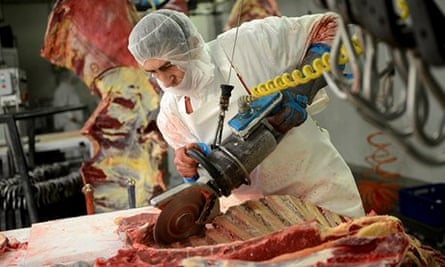
Described as a "big bear of a man" and "always in the engine room", he started in the meat trade at 16 and has an interesting history – he was identified in a major public inquiry in Ireland in the 1990s as a key player in scams to make fraudulent claims for European subsidies. These had involved falsifying weights on boxes of meat and faking documents. The three-year inquiry, known as the Beef Tribunal, was set up to investigate allegations of fraud and political corruption in the beef industry, and specifically at companies owned by Dundalk-born beef baron and property tycoon Larry Goodman. One of Ireland's richest and most controversial entrepreneurs, he is known for his hard work, love of private jets and for keeping his business affairs secret. Today, 50 million Europeans are said to eat products from his ABP group of factories each week.
The report of the inquiry, which helped bring down the Irish government of the day, found fraud and serious illegality in Goodman's companies in the 1980s that had involved not just the faking of documents, but also the commissioning of bogus official stamps, including those of other countries, to misclassify carcasses; passing off of inferior beef trimmings as higher-grade meat; cheating of customs officers; and institutionalised tax evasion.
Goodman said he had been unaware of any illegality and blamed Mackle as a rogue subcontractor in charge of a couple of his abattoir boning halls for falsifying weights while acting without authority. Mackle left the company and carried on in the trade on his own, but is said to have remained loyal to his old friend. The tribunal found no evidence Goodman had known, and both he and ministers were exonerated of improper political influence, except in the case of one development grant. Goodman had remarkable access to government, but the judge ruled that because his business was so important to the Irish economy it had been seen, properly, as in the national interest. It was a Goodman factory in Monaghan that in 2013 made beefburgers for Tesco that turned out to be 29% horse.
The unexpected visitor to Mackle's cold store last year was the environmental health officer (EHO) from the local district council, as Freeza's commercial director, Jim Fairbairn, recalled much later in a colourful appearance before British MPs investigating the horsemeat scandal at the Environment, Food and Rural Affairs (Efra) select committee.
This wasn't Fairbairn's first star turn – he had also played a prominent role in the Beef Tribunal, alongside Mackle. He too had been working for Goodman back then, running what was known as the "A Team", a sort of flying squad Goodman used to repack and relabel meat when necessary, often at night. When customs officers uncovered the fraud for which Mackle was said to have been responsible, Fairbairn concocted a panic plan to cover it up. The plan was to remove boxes of meat with falsified weights and swap them for new boxes containing the right weights that were labelled with faked official stamps and were to be brought in overnight from another Goodman factory. Fairbairn denied hatching a cover-up plan, but the judge ruled he was lying.
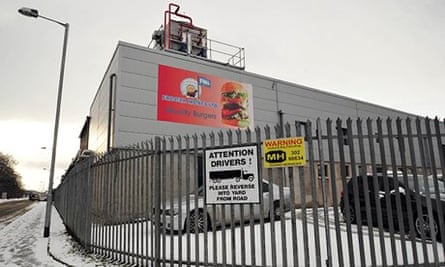
When the EHO arrived at the cold store in September 2012, she saw the parcel of rejected meat and noted that the packaging was torn and that some of the meat was exposed and freezer-burned; its accompanying documentation did not show who owned it or where it was going. Some of the boxes in the consignment had Polish labels but some had no labels at all, according to the head of the Food Standards Agency in Northern Ireland. Where it had come from, and exactly when, would become a subject of dispute too. But the EHO took one look at it and said: "That's not going into the food chain."
And so it was detained in the store at around -20C for months, until the horsemeat scandal erupted the following winter.
In January 2013, the Food Safety Authority of Ireland announced the shocking news that it had found horse in several "beef" burgers produced for high-street brands. Goodman, now in his mid-70s, and his ABP group – the initials derive from Anglo-Irish Beef Processors – once again found themselves at the heart of a scandal. As well as producing the beef burgers for Tesco that turned out to be 29% horse, the ABP Silvercrest factory in Monaghan had made burgers for the Co-op, Aldi and Burger King that tested positive for horse at much lower levels. Another ABP factory in Yorkshire had also produced adulterated products, and later tests would find its frozen beef mince for Asda was 29% horse too.
With the adulteration crisis spreading rapidly across Europe, drawing in more and more companies, the UK regulators remembered the parcel in the Mackles' Newry cold store and picked it up again. They finally tested it. It was horse, up to 80% horse in fact, and moreover, when they defrosted it, they found it was not just "Polish beef" but Polish horse and Irish horse stamped with Irish abattoir marks too. When the "Polish" labels from the boxes were checked with the Polish authorities, some of them were pronounced fake.
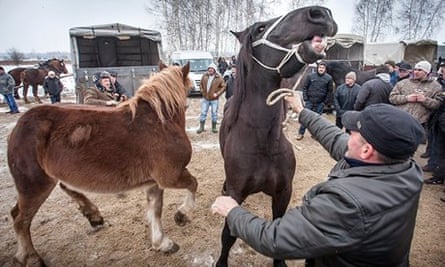
Who had created and applied false labels? Whose parcel was it? So far, it has been impossible to say. All those identified in relation to it have said they are innocent and victims of fraud elsewhere. All those who ended up processing and selling horsemeat have also said they have been innocent victims of fraud elsewhere and that they had never knowingly bought or handled horse.
The Newry parcel and the confusion over it mirrored the uncertainty that surrounded other consignments of adulterated meat being traced around Europe in other manufacturers' supply chains. Everyone seemed to be able to pass the buck down the line.
Freeza Meats disowned the parcel in its store. The company said it was just looking after it as a "goodwill gesture" for the Monaghan trader Martin McAdam. A supplier of burgers to Asda at the time, Freeza pointed out that none of its own beef products had tested positive for horse at any point. It said it had no idea it was giving a home to horse and had suffered considerably as a result of simply trying to be helpful. It completely rejected any attempts to link the current scandal to the Beef Tribunal, saying that those events had been 25 years ago and were irrelevant. "There is not, nor has there ever been, any relationship between Freeza Meats and the ABP group or any of its associated companies. We reject any attempt to link Freeza Meats to the shoddy practices of any third party."
McAdam, the trader who was said to have put the frozen meat into the cold store, acknowledged that he had indeed had a consignment of Polish meat rejected by a Monaghan-based manufacturer called Rangeland, which subsequently admitted supplying horsemeat unwittingly to UK wholesalers and caterers. He had asked Freeza Meats to store that meat because he was on holiday. But he claimed he had only ever bought what he thought was beef and had documents to show he had paid beef prices. He questioned whether the parcel of horse was really his.
Freeza Meats executive Fairbairn added to the confusion when he told the Efra committee that the parcel detained in his company's cold store had been rejected not by Rangeland, but by Goodman's ABP Silvercrest. McAdam was also named by ABP as the trader who had sourced Polish beef supplies that were adulterated with horse for its Silvercrest factory. But McAdam disputed ABP's account of their dealings and has lodged a claim against the company in the high court in Dublin for defamation. ABP has dismissed this claim as "spurious" and has said it will fight it.
ABP admitted it had strayed from its contracts with supermarkets that specified that it should use only Irish and British beef when making their burgers but it blamed rogue managers at the Silvercrest factory for acting without head office knowledge. ABP said that no one in the company had ever knowingly bought or processed horsemeat and that it was an innocent victim of fraud elsewhere. It has sacked the Silvercrest managers and sold the factory.
ABP's chief executive, Paul Finnerty, told me that the findings of the Beef Tribunal had no relevance to the horsemeat scandal. Where there had been illegality in the past, it had been the fault of subcontractors operating without the company's knowledge, he said. No breaches of law or food safety had been uncovered at ABP. The horsemeat adulteration was a Europe-wide problem involving many leading brand names, not just Goodman's group. ABP added in a statement: "There is no relationship between ABP and Freeza Meats. We have not traded with them for over 12 months and Jim Fairbairn left ABP over 20 years ago."
The retailers have all said they were "shocked" that horse had ended up in their beef products without their knowledge and have apologised to customers. They declined to answer my questions about which traders had been involved in their supply chains.
So, 10 months on from a crisis that led to millions of "beef" products being recalled across Europe, consumers still do not know the details of how equine DNA ended up in their food. Traceability and control of the food chain broke down spectacularly, but it is not clear that anyone will be found responsible.
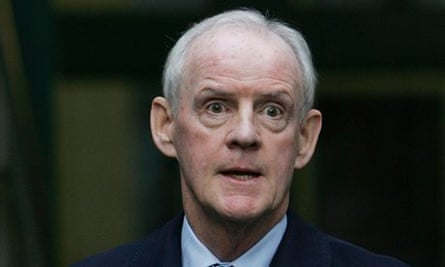
A sense of outrage has been growing, with politicians from both the main parties demanding answers to the long list of unresolved questions again last week. Labour's shadow environment secretary through most of the scandal, Mary Creagh, blamed UK ministers for being out of touch and splitting up the regulator, the Food Standards Agency, so that confusion reigned and opportunities to gather evidence were lost. "The horsemeat scandal was the largest consumer fraud ever committed against the British public. People don't understand why no one has been held to account."
Anne McIntosh, the Conservative chair of the Efra select committee, is equally outraged. She and another prominent member, Labour shadow minister Barry Gardiner, have vowed "not to let this go". Both have suggested that the Irish authorities may have been more concerned to protect what is their most valuable industry than to expose the full workings of the fraud, an accusation vigorously denied by the Irish.
"It's staggering that we still don't know where horse entered the food chain. Why have there been no prosecutions? Why have the Irish brought none? There are so many unanswered questions," McIntosh told me.
Many of the details about the parcel of horse at Freeza Meats were rehearsed before her committee, where MPs also challenged ABP's Paul Finnerty, about the Beef Tribunal and Goodman's history. Goodman had worked in the past through a hidden group of companies known as the Cork companies, in which his interests were held via nominees, including some in Liechtenstein. The true ownership of some companies had only emerged during proceedings to salvage the Goodman group when it faced bankruptcy, after its key customer, Saddam Hussein's Iraq, had defaulted on its debts. He turned out to have a large hidden shareholding in Rangeland. Both companies have told me that there is no link between them today.
Gardiner demanded to know whether the Cork companies were still in existence, or if there was a similar hidden structure that held interests in other meat companies. Had Mackle and Fairbairn engaged recently in similar activity to that of the 1980s, repacking and relabelling what turned out to be horse at Freeza Meats? Was the A Team back at work? Finnerty said he had no knowledge of the A Team and that there were no hidden structures. ABP had no corporate relations of any sort with any of the other companies caught up in the horsemeat saga. MPs also wanted to question Goodman himself, along with Mackle and McAdam, but they declined to come.
Investigations continue. Sales of frozen burgers have slumped by 43% as shoppers remember that an American fast-food invention is not the only meat you can eat. Supermarkets have begun to take more interest in short local supply chains but in practice they will need at least the three-year cycle from calf to fattened bullock to bring them on stream. Processors have forsworn long complex trading arrangements. Most of the big supermarkets have continued to source fresh meat from ABP throughout. Its market share is so large it would be hard for them to find sufficient supplies if they didn't. They say they will test and audit more, but otherwise it seems to be business as usual.
The public, upon whom the fraud was perpetrated, still await answers as to how it happened.
Adapted from the updated edition of Not On The Label: What Really Goes into the Food on Your Plate by Felicity Lawrence, published by Penguin on 31 October at £9.99. To order a copy for £7.49 with free UK p&p go to theguardian.com/bookshop or call 0330 333 6846.
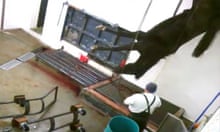
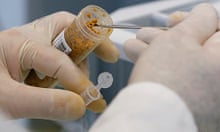
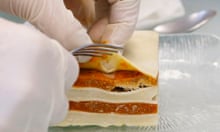
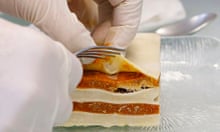
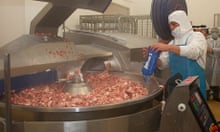
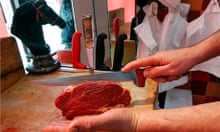
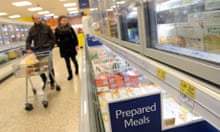

Comments (…)
Sign in or create your Guardian account to join the discussion